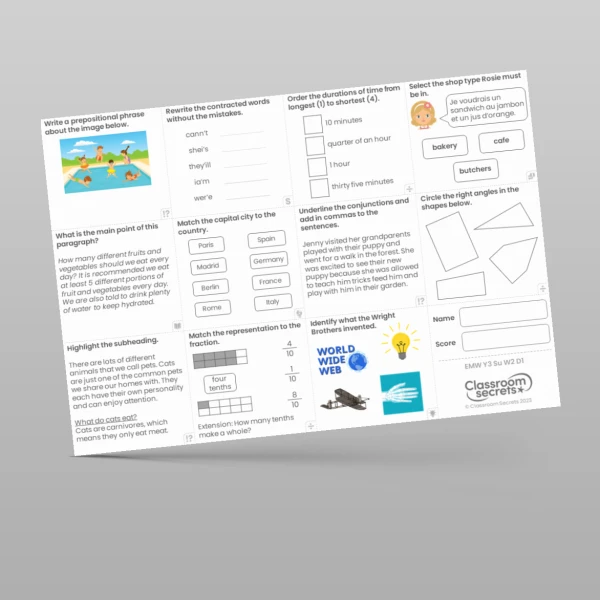

Our Year 3 Non-Negotiables Activity Pack is a great resource to use throughout the year to check children's progress against a range of topics. This number, calculations, fractions and time mixed assessment gives children a range of question styles to allow them to showcase their knowledge. The topics chosen in this pack are areas that come up throughout the maths curriculum across the Primary age range making the questions and skills involved a great stepping stone into the next year group's learning. The pack consists of a teacher's guidance page, a list of end of year expectations for year 3, the seven pages of questions based on the expectations and finally the answers.
Use this as part of your assessments throughout the year to show progress again key mathematical skills. This is the perfect resource for an independent task and can inform any gaps in children's learning and where an intervention program might be useful to plug those gaps. It can also be a great tool to use to show parents how well their child is progressing too.
This resource is designed to align to White Rose Maths version 3. Classroom Secrets Limited is not affiliated with, endorsed by, or in any way connected to White Rose Education Limited. Our products are original to Classroom Secrets Limited and any reference to White Rose Maths is solely for the purpose of indicating compatibility and does not imply any association with White Rose Education.
Curriculum Objectives
- Count from 0 in multiples of 4, 8, 50 and 100
- Compare and order numbers up to 1000 / Read and write numbers up to 1000 in numerals and in words
- Recognise the place value of each digit in a three-digit number (hundreds, tens, ones)
- Add and subtract numbers mentally, including: three-digit number and ones; three-digit number and tens; three-digit number and hundreds
- Add and subtract numbers with up to three digits, using formal written methods of columnar addition and subtraction
- Estimate the answer to a calculation and use inverse operations to check answers
- Recall and use multiplication and division facts for the 3, 4 and 8 multiplication tables
- Write and calculate mathematical statements for multiplication and division using the multiplication tables that they know, including for two-digit numbers times one-digit numbers, using mental and progressing to formal written methods
- Count up and down in tenths; recognise that tenths arise from dividing an object into 10 equal parts and in dividing one-digit numbers or quantities by 10
- Compare and order unit fractions, and fractions with the same denominators
- Add and subtract fractions with the same denominator within one whole [for example, 5/7 + 1/7 = 6/7 ]
- Tell and write the time from an analogue clock; 24-hour clocks
- Know the number of seconds in a minute and the number of days in each month, year and leap year
Tags
Test Practice
3N1b
3N2a
3N3
3C1
3C2
3C3
3C6
3C7
3F1a
3F3
3F4
3M4b
3M4e











